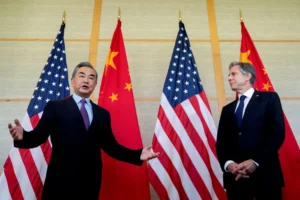During a rare meeting with Beijing’s senior diplomat, Wang Yi, US Secretary of State Antony Blinken warned China against giving “lethal support” for Russia’s invasion of Ukraine and denounced the claimed Chinese spy balloon’s infringement of US airspace.
The two senior officials met late on Saturday in Munich, Germany, outside of a conference on international security, only hours after Wang criticized Washington for being “hysterical” in a long-running disagreement over the US shooting down the suspected Chinese spy balloon.
Since Washington claimed that China sent a spy balloon over the country before US fighter aircraft shot it down on instructions from President Joe Biden, relations between the two nations have been tense. The conflict also occurred as the West closely monitors Beijing’s response to the conflict in Ukraine.
Blinken stated that he made it clear to Wang that doing so “would have serious consequences in our relationship” in an interview that will air on Sunday morning on NBC News’s “Meet the Press with Chuck Todd.” The US is extremely concerned that China is considering providing lethal support to Russia, Blinken said.
They are at least considering offering a variety of lethal support, including weapons, according to Blinken, who also stated that Washington would soon provide further information.
A senior State Department official told reporters on a briefing call that China was attempting to “have it both ways” by saying it wanted to contribute to peace and stability while also making “concerning” moves to back Russia’s invasion of Ukraine.
Under the condition of anonymity, the senior source said, “[The] secretary was pretty forthright in warning about the implications and consequences of China providing material support to Russia or helping Russia with systematic sanctions evasion.”
Just before Russian forces invaded Ukraine in February of last year, Russia and China signed a “no limits” partnership, and as Moscow’s ties to the West have deteriorated, so have their economic ties.
Some have warned that a Russian triumph would influence China’s policies toward Taiwan, thus the West has been concerned of China’s attitude to the conflict in Ukraine. China has resisted denouncing the conflict or labeling it a “invasion”.
Wang had earlier called for diplomacy at a panel discussion at the conference and advised European nations to “think carefully” about an end to the war.
Without naming any specific parties, he added that “certain forces” “appears to not want discussions to succeed, or for the war to stop soon.”
Blinken also expressed his disapproval of the suspected Chinese surveillance balloon’s intrusion during his discussion with Wang, the secretary of state stated in a tweet.
This month’s balloon flight over US soil caused a stir in Washington and forced Blinken to cancel a trip to Beijing. Both sides saw that trip, which would have been the first by a US secretary of state to China in five years, as an opportunity to normalize the increasingly tense relations.
Blinken claimed that Wang did not apologize for the balloon’s flight in the interview with NBC.
Regarding the balloon’s violation of US airspace, Blinken stated, “I told him pretty plainly that that was unacceptable,” adding that he had not talked to Wang about delaying his trip to China.
When the US military shot down the 60-meter (200-foot) balloon on February 4 and claimed it was for weather monitoring and had blown off course, China responded strongly. Washington claimed that it was unmistakably a surveillance balloon with a sizable electronic-holding substructure.
According to Chinese state news agency Xinhua, Wang claimed that the way Washington responded to the balloon had harmed their nations’ relations.
Wang “made plain China’s solemn position on the ‘airship incident,'” according to Xinhua, and “urged the US side to alter direction, acknowledge and repair the damage that its excessive use of force caused to China-US relations.”
Wang had called the US response to the balloon “hysterical and stupid” earlier in the day on Saturday.
A sophisticated fighter plane being sent out to use a missile to shoot down a balloon is an absurd and even crazy act, he added.
Wang also charged that the US was denying China’s economic development and actively working to obstruct it.
We want the US to approach China with pragmatism and positivity so that we can cooperate, the official added.
Blinken and Wang’s decision to re-engage in person during the conference in Munich had been questioned, and the State Department only confirmed their hour-long meeting after it had ended.
With China’s response to Nancy Pelosi’s visit to Taiwan as speaker of the US House of Representatives in August, relations between the two countries reached a dangerous low. Washington had hoped to restore some normalcy to the situation.
A senior Pentagon official is scheduled to visit Taiwan shortly, according to a Financial Times report from Friday, which raises the possibility that the reset could be put to the test once more.
In Munich as well, US Vice President Kamala Harris emphasized how Washington was “concerned that Beijing has strengthened its alliance with Moscow since the war began.”

Looking ahead, she stated that “any actions by China to offer lethal support to Russia would merely reward aggression, keep the killing going, and further undermine a rules-based world.”




